

Shano
-
Content Count
22 -
Joined
-
Last visited
Posts posted by Shano
-
-
1 hour ago, Dave Nottage said:It would help to know what error messages there are, if any. Also, please indicate what happens when you follow these steps:
- Open the Project Options for your project
- On the left, select Deployment > Provisioning
- Select the relevant target i.e. iOS Device 64-bit
- Select a Build type of: iOS Device 64-bit - Development
Then report whether or not a relevant provisioning profile is found
Hi Dave,
Yes there is a Debug Configuration - iOS Device 64-bit platform selected.
The error is -
[PAClient Error] Error: E0003 Connection to 'localhost' on port 64211 failed
[PAClient Error] Error: E0003 Please make sure that 'Platform Assistant Server' is running on the host machine and is configured to use port 64211But it is connected to the PA Server
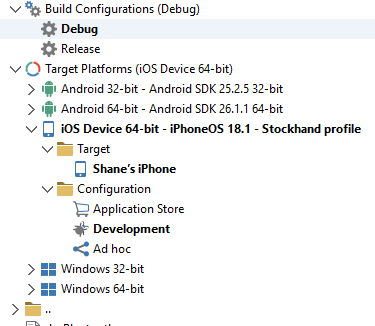
PA Server command line - "/usr/bin/security" find-identity -v
-
Does anyone know if it is possible to deploy an iOS App developed with Delphi 12.3 to an iOS Device?
Android
I am able to Deploy to Android 35.
I am able to debug on Android 35. (Although it takes an extremely long time to start)
iOS
I can build an app and with Release Build Configuration for the Application Store and Deploy it to my Mac and use Transporter to upload it to Apple. (All good - Yehah something works)
I CANNOT build for debug and deploy to an iOS device. (Pretty important) - iOS device is running 18.5. XCode 16.1 installed on the Mac and the PA Server is running and Delphi is connected successfully.
Can anyone offer any suggestions please.
-
Just now, Dave Nottage said:The debugger for Android has been unusable* for me for some time now. I have learned to live with using log statements and a logcat viewer, such as Device Lens.
*I guess that aligns with not being able to debug on iOS, too.
I, too, have been using Log.d and Monitor.bat
I just thought there had to be a better way, as waiting for the debugger to start is such a waste of time.
-
Does anyone know how to speed up the Delphi 12.2 Debugger?
I have an Android device connected to my Delphi, and if I set a breakpoint in the FormCreate and set a breakpointin the FormShow.
It takes 4 minutes to reach the FormShow event, which is a ridiculous amount of time and makes debugging utterly useless.
procedure TMainForm.FormCreate(Sender: TObject);
var
i : integer;
begin
// breakpoint herei := 0;
end;procedure TMainForm.FormShow(Sender: TObject);
begin
// breakpoint hereShowMessage('FormShow');
end;If you run the application without debugging, it takes seconds to see the FormShow message on the screen.
Thank you in advance.
-
On 12/17/2024 at 11:32 PM, moises@coderbox.com.br said:Hi, @zburns
I managed to solve the issue using Delphi 12.2, macOS Sequoia 15.2, by following these steps:
-
Download the Xcode versions:
- Download Xcode 16.2 directly from the App Store.
- You’ll also need an older version of Xcode (15.4 in this case) to access a compatible SDK.
- Older versions of Xcode are available here (you might need to log in).
-
Set up the older Xcode version:
- After downloading Xcode 15.4, extract it to a location different from the "Applications" folder (where the current version is installed).
-
Open the Terminal on your Mac (/Applications/Utilities/Terminal) and run the following command:
Replace
sudo xcode-select -s [path]/Xcode.app[path]with the location where you extracted Xcode 15.4.
-
Import the SDK in Delphi:
- In Delphi, you should now be able to import the iOS 17.5 SDK, and the required profiles should appear.
-
Switch back to the default Xcode (optional):
-
If you want to revert to the default Xcode version, run this command in the Terminal:
sudo xcode-select -r
-
If you want to revert to the default Xcode version, run this command in the Terminal:
I hope this helps! 😊
I tried all of the above and still had issues not seeing the development certificate in Delphi 12.2.
I ended up creating a Test App in Xcode and installing that onto my iOS 18 device. I then closed everything down and restarted everything. I could then see the correct Provisioning Profile and certificate in my Delphi 12.2 Provisioning Area. I could then run my app in Delphi 12.2, which transferred my app to my iOS device successfully. The xcode Test App must have put everything required by the PAServer in the correct place.
-
-
23 hours ago, Dave Nottage said:I mean not being able to have the debugger attach to the process on the device at all, regardless of whether or not there are breakpoints set.
The install process should still succeed.
If this an error you receive when attempting to install the app on the device using the IDE, it sounds like you have a development (as opposed to App Store) certificate/profile issue.
After wiping my MAC and reinstalling everything again with no luck, I ended up creating a test app in xcode using the certificates and then everything started working and I could then deploy my app to my iOS 18 device. The test project must have put everything in the right place required by the PAserver.
On the bright side of life I now have an extremely clean MAC. 🙂
-
 1
1
-
-
On 2/8/2025 at 4:12 AM, Dave Nottage said:I'm using macOS 15.3, Xcode 16.2 with an iOS 18.3 device with no issues, other than being unable to debug (which has been a problem since iOS 17).
Hi Dave,
I have the same setup as you, thanks for the pointer regarding using 16.1 and not 16.2.
When you say no debugging, do you mean you cannot create breakpoints, or can't even transfer the App to the iOS Device via running it with debug and the iOS device selected.
I am asking, because I can build and create an ipa file that I can then use the transporter to upload without error, but I cannot click run and install the app onto my registered test devices.
I keep getting an error 'Unable to find certificate' 'XXXXXX' in provisioning profile "ffdssdfsdfdsfdsfsdf"
-
1 hour ago, Shano said:It is absolutely ridiculous that Embarcadero do not provide download links to the versions of the SDK and NDK that is compatible with each version of the Delphi IDE.
There should be a Git Package for each Delphi Version.
The amount of time I have wasted trying to get Delphi 12.2 to build an Android App which was previously building with Delphi 12.1 is just ridiculous!
Does anyone have a List of Steps to follow that will work to upgrade the Delphi Delphi 12.2 SDK and NDK
Currently I have this setup.
Thank you in advance.
Turned out in the end I needed to follow these steps.
Your applicationName.dproj needs to look like -
<Platform Condition="'$(Platform)'==''">Android</Platform>
<PlatformSDK Condition="'$(PlatformSDK)'=='' And '$(Platform)'=='Android64'">AndroidSDK26.1.1_64bit.sdk</PlatformSDK>-
 1
1
-
-
-
On 1/4/2025 at 8:28 PM, GabrielMoraru said:Yes. Delphi's documentation was always in a deplorable state.
Since I had problems installing the SDK, I wanted to follow their documentation.-----------
I used FMX some years ago and I don't remember having any of this problems. Is FMX getting worse instead of better?

(Rhetoric question)It is absolutely ridiculous that Embarcadero do not provide download links to the versions of the SDK and NDK that is compatible with each version of the Delphi IDE.
There should be a Git Package for each Delphi Version.
The amount of time I have wasted trying to get Delphi 12.2 to build an Android App which was previously building with Delphi 12.1 is just ridiculous!
Does anyone have a List of Steps to follow that will work to upgrade the Delphi Delphi 12.2 SDK and NDK
Currently I have this setup.
Thank you in advance.
-
 1
1
-
-
I Have Delphi Athens installed and am trying to build a 64 bit app and I am gettting this message.
[DCC Fatal Error] F1026 File not found: 'C:\Users\Public\Documents\Embarcadero\Studio\23.0\CatalogRepository\AndroidNDK-21-23.0.51961.7529\android-ndk-r21\toolchains\aarch64-linux-android-4.9\prebuilt\windows-x86_64\aarch64-linux-android\bin\ld.exe'
I do not have a path C:\Users\Public\Documents\Embarcadero\Studio\23.0\CatalogRepository\AndroidNDK-21-23.0.51961.7529\android-ndk-r21
I have a C:\Users\Public\Documents\Embarcadero\Studio\23.0\CatalogRepository\AndroidNDK-21-23.0.53982.0329 path.
I want to build Apps for iOS18 and Android 14 (API level 34)
How do I fix this please.
-
-
@Dave NottageLooking into it further and I think it is because I do not include the required libraries: libcrypto and libssl when deploying the app.
Is there any easy way to do this? Can I just put the files on the mac in the scratch-dir?
Can I download the compiled versions of the files from anywhere or do I have to go through the process of compiling them myself?
When you follow Embarcadero's link to get the files, the first thing I read is "I urge you to not use this project" 🙂
Thanks
-
Hi have a mobile app currently built using Delphi 12.
My apple is a Mac Mini, Apple M1, Sonoma 14.2
The app can connect with the Rest server using HTTP, using Indy with no problems.
When I run the iOS simulator, It failed to connect to the server.
Are there any settings that I am unaware of that give the iOS Simulator access to HTTP connections?
Thanks Shane
-
27 minutes ago, Dave Nottage said:It appears Xcode 15.1 has broken Delphi - I'm having the same problems with that version. Reverting to an earlier version may fix it. I'm about to find out.
Yes I reinstalled the last official release Xcode 15.0.1 - Oct 18 2023 and all works as expected. Well that only cost me half a day.
Thanks.
-
 1
1
-
-
4 minutes ago, Dave Nottage said:Sorry about that.. I'm sure I have seen a similar error mentioned before, however I'm unable to find a reference for it. Which version of Xcode are you using?
I have xcode 15.1 installed.
I think it is a Delphi Error though, using the incorrect call to the PAClient. I am not trying to run the simulator. I am trying to delpoy to the mac.
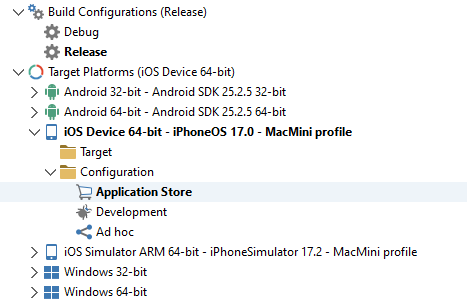
-
17 minutes ago, Dave Nottage said:Is your Mac an M1 or M2 or M3 device?
M1
17 minutes ago, Dave Nottage said:Is your Mac an M1 or M2 or M3 device?
If so, start Xcode on the Mac, and click the Xcode menu, Open Developer Tool > Simulator. If you're able to do that, I'm not sure what the issue is.
If your Mac is not an M1, M2 or M3, you're out of luck - Delphi supports only ARM-based Simulator, which is available on those kinds of Macs
I can open the simulator from Xcode.
Problem is I do not want to use the simulator. I want to build a Release for submission to Testflight, but everytime I try to deploy the App, for some reason it tries to run the simulator. I just want to reset so that the Release deployment works as it used to,
Platforms = (com.apple.platform.iphonesimulator)
-
Hi,
I am using Delphi 12
I decided to try the iOS simulator out which was a huge mistake, because now I cannot deploy my release App.
When I deploy Delphi keeps trying to deploy to the iOS simulator it seems.
Anyone know how to fix this issue?
[PAClient Error] Error: E6664 /Users/MyUserName/PAServer/scratch-dir/MyMac/AppName.launchscreen/Assets: error: The operation couldn’t be completed. Failed to locate any simulator runtime matching options: {
I tried deleting all the files in the Scratch directory on my Mac already.
-
On 11/17/2023 at 7:42 PM, Brian Evans said:Not sure there is much of a point in doing that - an AAB provides information so an app store can generate APKs for multiple devices. Using an AAB locally just adds extra steps to building and sending an APK to a device for testing.
What's the difference between AABs and APKs?
App bundles are only for publishing and cannot be installed on Android devices. The Android package (APK) is Android's installable, executable format for apps. App bundles must be processed by a distributor into APKs so that they can be installed on devices.
Well I can't seem to get the aab that I submit to Google Play to provide a version for my Android device that is a 64bit device, using a 32-bit mode when submitting a build for testing. I would have thought the Google Play internal Testing area would also use the aab file to create versions of the app that can be installed onto these devices for testing. I understand that to iinstall an APK onto the phone it would need to be built using either the 32-bit target or the 64-bit target. That works. If I build a 32-bit version then I can install the APK onto the 64-bit device using 32-bit mode. That installs perfectly. Just the aab file that I subit to Google Play and then expect to be able to install on the device from the Google Play internal Testing link does not. We also have release the App live and the devices cannot install it onto these devices either and we have the setting correct in the previously submitted aab files as well.
-
21 minutes ago, Dave Nottage said:This applies only when generating an application for uploading to Play Store (.aab file). If you're in "development mode" and your device supports 32-bit only, just select Android 32-bit as the target.
@Dave NottageThat is what I thought. When in development and have a 32 bit device connected, then select 32 bit development and when I have a 64bit device connected select the 64 bit tarket. That works fine.
But when I build the App and deploy, creating the .abb file which I then submit to internal testing, using the developer console, and then install the internal testing version on my 32 bit app I receive the message the
* "Your Device isn't compatable with this version."
* "You're an internal tester. This App maybe unsecure or unstable"
Does the Android App Bundle Support only work once the App has been submitted as a live App and is available on Google Play for all to download using either a 32bit or 64bit device? I would have expected the Android App Bundle Support to also work in the Internal Testing side as well.
-
@Dave Nottage Hi, so is the only way to make sure Android App's developed using Delphi 12, is to build 2 2 separate apps? One targeting the 32 Bit architecture and the other 64 bit Architecture? App - 32, and App - 64
Is that correct? I have the Generate Android 32-bit and 64-bit binaries set to True and when I try to install the 64 Bit onto the device I receive "Your Android device does not support the selected target platform architecture" and I have confirmed that the device is running in 32 bit as you suggested above?
Thanks in advance.
![Delphi-PRAXiS [en]](https://en.delphipraxis.net/uploads/monthly_2018_12/logo.png.be76d93fcd709295cb24de51900e5888.png)
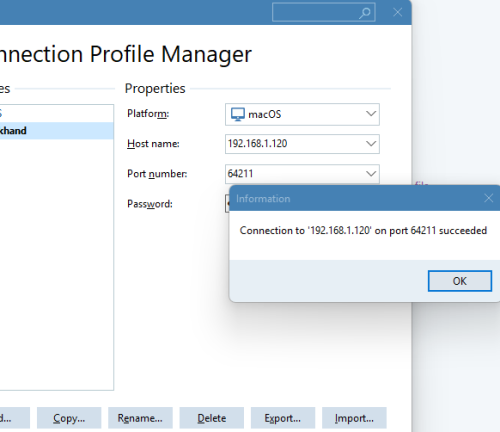
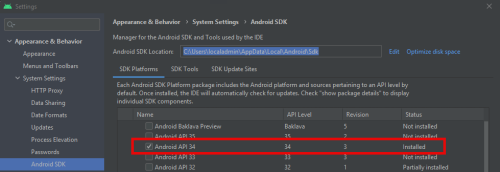

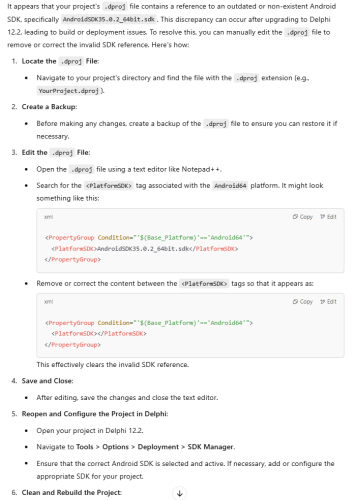
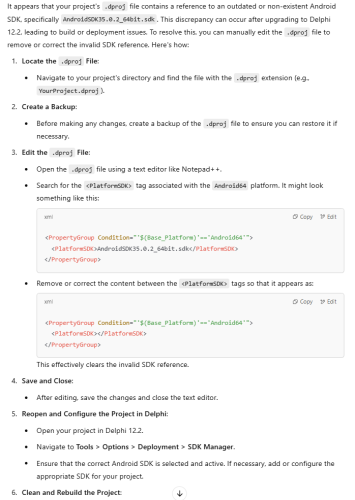

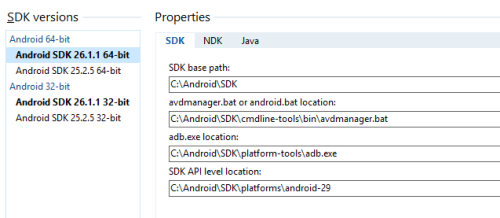

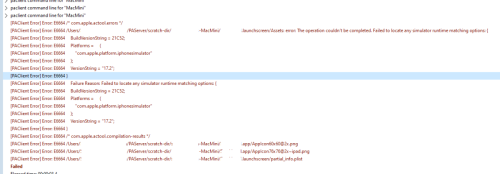
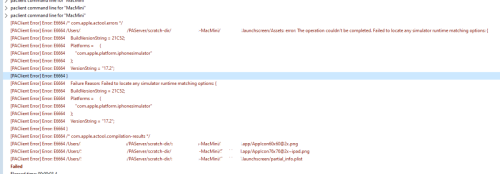
Deploying Delphi 12.3 iOS App to iOS Device
in FMX
Posted
Firewall was off on the Mac already.
Closed down and restarted and messed around with some settings and it all started working.
Just another Delphi refreshing issue from the looks of things.